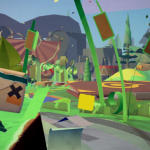When Games Matter is a weekly exploration by Drew Dixon of meaningful moments in games. Operating under the assumption that games do in fact matter, Drew seeks to highlight those moments that have much to say about who we are and the world we live in.
Deus Ex: Human Revolution came out a week ago. Its a game that by all accounts I should love. I am a huge fan of the original Splinter Cell Trilogy as well as most of Bioware and Bethesda’s roleplaying games. DX:HR promised to combine the best of both of those worlds and in many ways it does.
The year is 2027 and the world is experiencing a revolution in biotechnology, namely in the realm of human augmentation. Essentially people are augmenting their bodies in order to make themselves stronger, faster, and even smarter. Augmentation, however, is very expensive and consequently has further divided the world by class. You play as someone who can sympathize with both “Augs” (augmented humans) and purists (those who are morally opposed to augmentation). You are Adam Jensen, the head of security of a leading biotech firm who was nearly murdered but whose life was saved by augmentation that he did not ask for.
Playing as an “Aug” comes with special privileges–abilities to sense enemies, move stealthily, fight more aggressively, and even psycho-analyze people you talk to. However, there are some things that being an “Aug” doesn’t help you with, like climbing fences. The artistic direction, the script, the music, and the characters all serve to immerse the player into the world of a 2027 Detroit on the brink of revolution. But navigating the city is so frustrating at times, that I found this sense of immersion utterly shattered at times.
One quest in Detroit requires you to meet someone in an alley behind the police station. I can see the Alley but it is blocked by a fence. I searched all around the station and could not find any direct route to access the alley. I ended up finding my way to the alley by going inside the police station and sneaking through a maze of ventilation ducts and then climbing down to the alley from the roof. It took me a good 10-15 minutes to reach that alley and by the time I did, I was tired, annoyed and no longer cared about the quest.
Perhaps I was missing something really obvious about how to reach that alley, but for such a polished and interesting game, DX:HR sure does make simple things complicated sometimes. Navigation in this game is frustrating to say the least–my “alley” experience isn’t the only time getting from point A to point B has been frustrating.
That said, the games narrative and mechanics are interesting and compelling enough for me to keep playing but the unwieldy nature of navigating the game almost made me quit. Is there a time when a design choice in game nearly ruined the experience for you?











